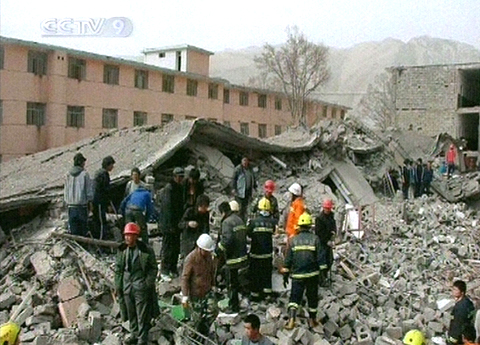Strong earthquakes struck a mountainous Tibetan area of western China yesterday, killing at least 400 people and injuring more than 10,000 as houses made of mud and wood collapsed, officials said. Many more people were trapped and the toll was expected to rise.
The largest quake was recorded by the US Geological Survey as magnitude 6.9.
Panicked people, many bleeding, flooded the streets of a Qinghai Province township where most of the homes had been flattened. Students were reportedly buried inside several damaged schools.

PHOTO: AFP
Paramilitary police used shovels to dig through the rubble in the town, footage on state TV showed. Officials said excavators were not available and with most of the roads leading to the nearest airport damaged, equipment and rescuers would have a hard time reaching the area. Hospitals were overwhelmed, many lacking even the most basic supplies.
Downed phone lines, strong winds and aftershocks also hindered rescue efforts, said Wu Yong, commander of the local army garrison.
With many people forced outside, the provincial government said it was rushing 5,000 tents and 100,000 coats and blankets to the mountainous region, at about 4,000m high and where night-time temperatures plunge below freezing.
Taiwan’s National Fire Agency said a 23-member rescue team could leave for Qinghai within hours to provide relief assistance.
The Red Cross Society of the Republic of China also said it had been in contact with China’s Red Cross and was ready to set off for the earthquake-hit region to provide support and assistance.
ADDITIONAL REPORTING BY CNA

MORE VISITORS: The Tourism Administration said that it is seeing positive prospects in its efforts to expand the tourism market in North America and Europe Taiwan has been ranked as the cheapest place in the world to travel to this year, based on a list recommended by NerdWallet. The San Francisco-based personal finance company said that Taiwan topped the list of 16 nations it chose for budget travelers because US tourists do not need visas and travelers can easily have a good meal for less than US$10. A bus ride in Taipei costs just under US$0.50, while subway rides start at US$0.60, the firm said, adding that public transportation in Taiwan is easy to navigate. The firm also called Taiwan a “food lover’s paradise,” citing inexpensive breakfast stalls

TRADE: A mandatory declaration of origin for manufactured goods bound for the US is to take effect on May 7 to block China from exploiting Taiwan’s trade channels All products manufactured in Taiwan and exported to the US must include a signed declaration of origin starting on May 7, the Bureau of Foreign Trade announced yesterday. US President Donald Trump on April 2 imposed a 32 percent tariff on imports from Taiwan, but one week later announced a 90-day pause on its implementation. However, a universal 10 percent tariff was immediately applied to most imports from around the world. On April 12, the Trump administration further exempted computers, smartphones and semiconductors from the new tariffs. In response, President William Lai’s (賴清德) administration has introduced a series of countermeasures to support affected

CROSS-STRAIT: The vast majority of Taiwanese support maintaining the ‘status quo,’ while concern is rising about Beijing’s influence operations More than eight out of 10 Taiwanese reject Beijing’s “one country, two systems” framework for cross-strait relations, according to a survey released by the Mainland Affairs Council (MAC) on Thursday. The MAC’s latest quarterly survey found that 84.4 percent of respondents opposed Beijing’s “one country, two systems” formula for handling cross-strait relations — a figure consistent with past polling. Over the past three years, opposition to the framework has remained high, ranging from a low of 83.6 percent in April 2023 to a peak of 89.6 percent in April last year. In the most recent poll, 82.5 percent also rejected China’s

PLUGGING HOLES: The amendments would bring the legislation in line with systems found in other countries such as Japan and the US, Legislator Chen Kuan-ting said Democratic Progressive Party (DPP) Legislator Chen Kuan-ting (陳冠廷) has proposed amending national security legislation amid a spate of espionage cases. Potential gaps in security vetting procedures for personnel with access to sensitive information prompted him to propose the amendments, which would introduce changes to Article 14 of the Classified National Security Information Protection Act (國家機密保護法), Chen said yesterday. The proposal, which aims to enhance interagency vetting procedures and reduce the risk of classified information leaks, would establish a comprehensive security clearance system in Taiwan, he said. The amendment would require character and loyalty checks for civil servants and intelligence personnel prior to